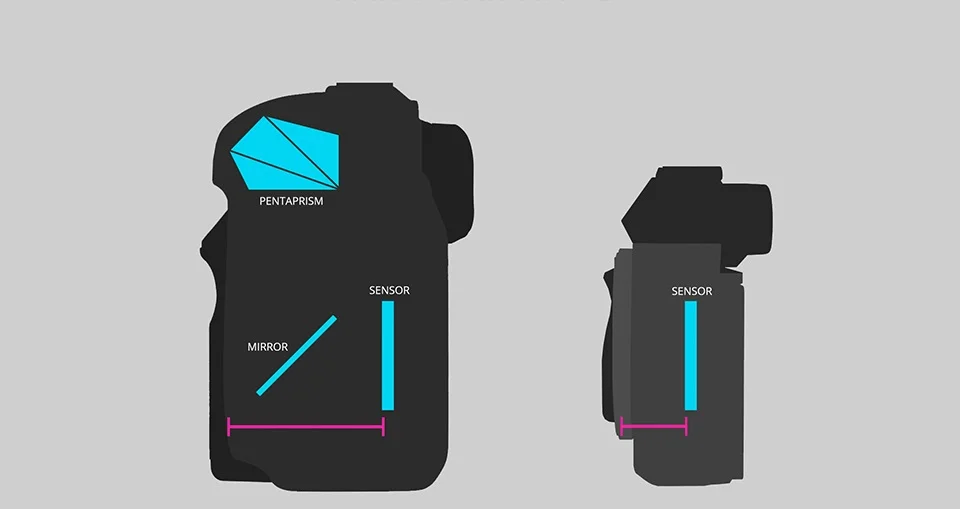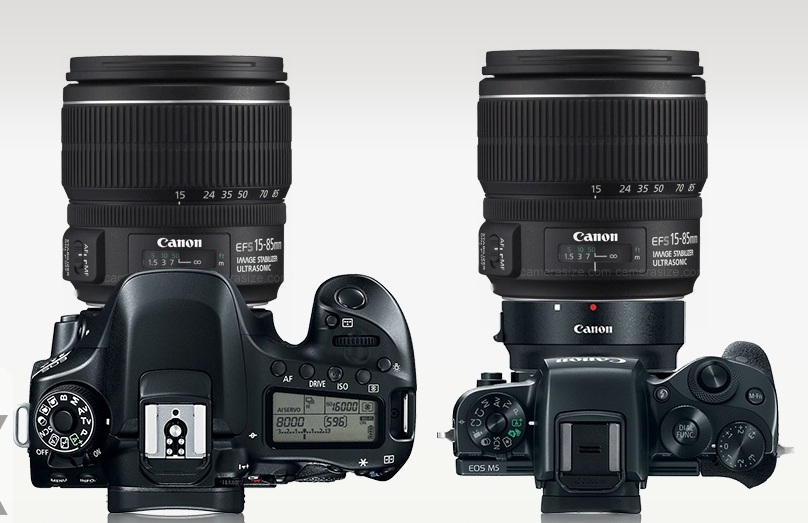DSLR VS MIRRORLESS [So you wanna buy a mirrorless camera (part 2)]
When discussing these cameras a few years ago I could confidently say “Hey, let’s do a blog title “Which is better”, and confidently come up with a winner. What a difference a handful of years make… Now I answer the question “Which is better” by giving the answer “ That is dependent on what your preference is and your workflow”. I’ll go in depth on the minutia for my reasoning but for those that want a TL;DR I’ll break it down like this.
Remove the pentaprism and the mirror from the DSLR; you start to streamline to a smaller size and a lighter weight.
AMATEUR
~ [looking to understand or get into photography]
BUY 35mm FILM CAMERA
~ [don’t wanna do film] dSLR entry level
~ [younger/older photographer] mirrorlessPROSUMER ~ [vacationer] mirrorless
~ [vlogger/blogger] mirrorless
~ [younger / older shooter] dSLRPROFESSIONAL ~ [self employed photographer] dSLR
So why would you want a mirrorless camera? When considering how long you’d be holding on to the camera shooting, and with certain heavier lenses, the much needed break in size and weight is a godsend. I would recommend going mirrorless if you are going “lighter” on photography gear. Perfect for the upcoming vacation/ convention seasons, you’ll travel lighter and won’t sacrifice the image quality if you did think of going mirrorless. Also, the younger and older photographers out there should think of going mirrorless as the size and weight won’t tire you out physically when going out shooting. To not overstate the weight and size a vlogger or blogger will struggle less with a nice light lens and a mirrorless camera on a mini tripod like the Joby GorillaPod. Lastly I wanna touch on this cautionary warning. A dSLR has a mirror and a shutter screen that blocks the sensor and acts as a protector from any dust or damage to the sensor, with the mirrorless camera…you don’t have that protection. Essentially any dust, dirt, scratches, or splashes that would get into a mirrorless camera would effect the sensor, and any damage to the sensor could very well ruin the camera. I don’t want to deter you from getting what technologically speaking is a “as-good or better than dSLR” camera, and extreme instances of carelessness would be the only cause damage that bad.
Your back and camera bag will thank you for switching or choosing mirrorless cameras as your photography choice.
The difference to (left) Canon 80D with lens and (right) Canon M5 w/ adapter and same lens is non-existent.
Now, on the flip side… Let’s say you are deterred by the sensor being exposed when changing lenses and what have you. Let’s also say that you’ve been using film SLRs of a certain brand that work with dSLRs without the need for adapters (more on this later). Let’s also say that comparatively you want a longer battery life (500+ shots on average), the weight difference isn’t important (on average the weight difference is 2-3lbs), and price is of some concern. Well then, welcome to dSLRs where almost 30 years of digital technology have been developed inside SLR bodies. The glass in almost every instance has a 30+ year timeline which is usable with AF (auto focus) on dSLR cameras today, without adapters. Nothing against mirrorless cameras, but the added weight for the ability to use legacy or vintage cameras almost mitigates the size and weight advantage mirrorless cameras have. Lastly there’s every serious and professional photographer’s nightmare: Disk Error & Data Corruption. The mirrorless option has a few answers to this issue, offering dual SD or CF slots, but dual slots is almost a standard on profession dSLRS. You the reader must be asking “with all these advantages, why even go mirrorless”. Here’s where, beyond the facts given, my opinion comes in.
FINAL THOUGHTS
Canon is the company I chose. I have few reservations after choosing the brand after learning photography on my old Canon AE-1 camera. I was familiar with Canon’s product lingo so I wasn’t lost in trying to determine if an EF-S lens would work on a specific body, or vice versa. Over the years I’ve seen Canon really innovate their AF game while losing the fight to certain Nikon cameras. When mirrorless came out swinging I paid attention to Sony (though Fujifilm was not taken for granted) and the a7 series of mirrorless cameras. Their color science and image quality was amazing. I’m on the precipice of, adapting another brand of cameras, and with my trip coming up I just may, but currently mirrorless cameras of any brand just isn’t justified YET for me….is it for you?
Next week, if you are going mirrorless I’ll have a list of cameras both current and a generation or two behind that are real workhorses and should be considered if you are buying a mirrorless camera. The following week will be a buyers guide for dSLR cameras, to give each “type” their own spotlight. I will preface two thing each week as I wrap up now.
GET GLASS FIRST! I cannot stress getting high quality lenses in your brand’s wheelhouse before the camera. Pick up a cheap body or an older body, or snag a deal…but get GLASS first!
The gear does not make the photographer. If you have THE camera and lens to end all cameras and lenses it does nothing if you can’t understand proper exposure and composition. The gear can “cover up” shortcomings but peers will notice and you’ll be a better photographer starting small.
None of what I write, show, or vlog will matter a damn if you…yes you, do not break from the internet and go out shooting and experimenting yourself. You will be a tenfold better photographer by learning from your mistakes and stumbling upon happy accidents before learning from me or anybody else.
So go snap pics and be active, always learning from each shot and less concerned with gear; just concerned that the next photograph you make will be better than the last. Cheers!



